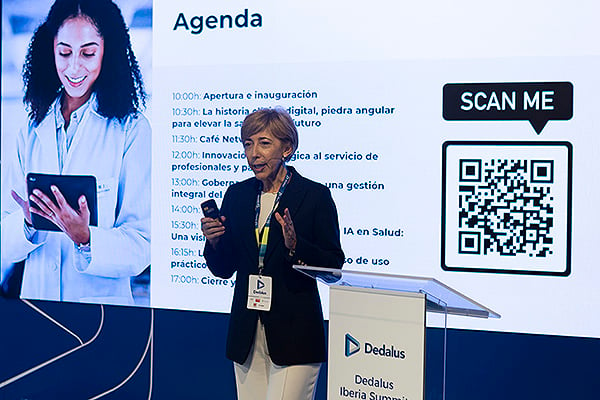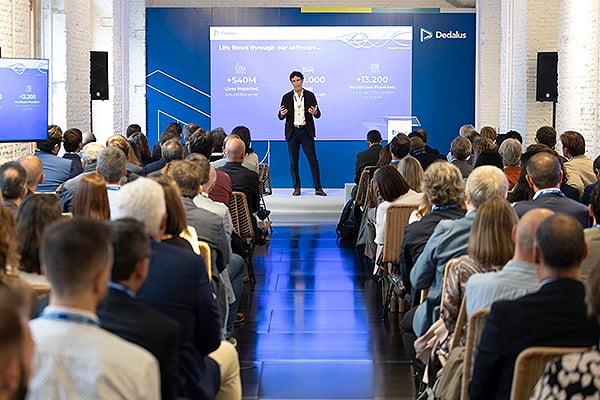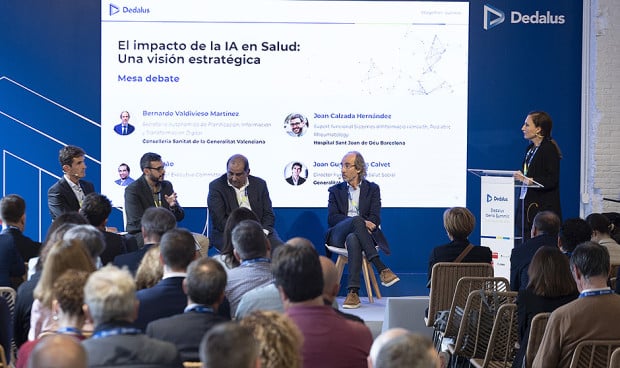

A moment from the table ‘The impact of AI in Health: A strategic vision’ of the Dedalus Summit event.
“We have urgent needs to improve patient care, make processes more efficient and measure value. we can’t develop personalized and preventive medicine without new capabilities, with artificial intelligence as the main protagonist,” said Bernardo Valdivieso, regional secretary of Planning, Information and Digital Transformation of the Health Department of the Generalitat Valenciana.
Healthcare is undergoing a great digital revolution. For this reason, Ivo Antão, member of the Luz Saúde Executive Committee, has focused on the need to optimize health resources and prevent. “It is important to have data, see what its dimensions are and for health organizations to know that they will have to model process behavior related to AI,” he indicated, while adding that professionals will require support to adapt to this situation.
In this sense, there are numerous aspects in which these digital tools can have a place. For example, Joan Calzada, pediatrician at the Sant Joan de Déu Barcelona Hospital and functional manager of the information systems functional competence center, has put on the table the value of AI in patient safety. In the words of this specialist, it is key to identify alerts and indicate laboratory and image parameters, among others, since it can detect what professionals may not detect and generate a direct return in terms of patient safety. “In addition to using AI in clinical practice, it is also essential apply it in teaching and research. We must develop it in these three pillars,” Calzada pointed out.
Without a doubt, implementing AI-based solutions will bring many benefits to both health professionals and society as a whole. For this reason, the pediatrician at the Sant Joan de Déu Barcelona Hospital has been positive and has defended that it will also improve the doctor-patient relationship, since it has the power to increase unbureaucratized spaces that allow for a deeper understanding of the “empathy in the doctor-patient relationship and multiply trust.” “AI is going to have biases and we will have to detect them and try to minimize them in the development of AI-based solutions, but it will have numerous advantages because it will also be the springboard for the professional’s own knowledge,” he concludes.
For his part, Joan Guanyabens, director of the ICT Social Health Foundation of the Generalitat of Catalonia, has highlighted the importance of setting priorities and the problems you want to address when using AI. According to Guanyabens, it should be the health administrations that define these lines and thus take advantage of “the good level of digitalization and the quality of the data” that we have in Spain. “We have economic resources and we have data, therefore, the Administration is responsible for ensuring that we do it well and define how to proceed,” he commented.
How can we apply AI with purpose?
Guanyabens explained that Catalonia considers Primary Care (PC) as a level with great possibilities in the use of AI thanks to images. For example, it is expected that Waiting lists improve when referring to Dermatologyespecially when it comes to accessing the specialist, and they are working on a specific project to achieve this.
At the same time, they believe that these tools can serve to iInform the citizen about the effects of the medication and contraindications. In short, “move towards the debureaucratization of the Primary School.” “These technologies can save time for healthcare professionals, who spend many minutes making reports, diagnoses and recording information. The key will also be to see what we dedicate this time to, I believe it should be in favor of gaining what has the most value: the trust and esteem that the patient has with the health system and its professionals,” said Guanyabens.
In fact, the Sant Joan de Déu Hospital in Barcelona has implemented a system that identifies the fractures with a specificity of 97 percent. To this are added other projects in development to read chest x-rays, to make medical record summaries and a discharge and admission prediction system. “The latter started years ago as a simple algorithm and is constantly evolving,” added Calzada.
In the Valencian Community, for their part, they also have practice with the management of AI, focusing, according to Valdivieso, on transforming the healthcare architecture to use quality data and introduce tools automation. “We are working on the breast cancer screening program to introduce AI that allows us to stratify mammograms to, on the one hand, prioritize the readings of women who are at high or intermediate risk, and thus guarantee access to tests and treatment in time in cases where it is necessary and, on the other hand, to modify the reading method by replacing double reading with AIalong with a human reading in low-risk cases, which will allow us to increase our capacity to make the program more efficient,” he detailed, “while we are preparing the digital architecture to scale these tests to the entire community,” concludes.
All of these are examples of good practice that the speakers wanted to share and agreed on the same thing: the need to be in contact between all the agents and not repeat themselves. Experts have advocated for an AI with public-private collaborationwith collaborative teams that give different visions, and have alliances to share developments and experiences, also in the university environment.
Practical use case of AI in health
To end the day, the company Dedalus explained a use case for a Generative AI in the electronic health record (EHR) which he has led together with health organizations such as the Sant Joan de Déu Hospital (Barcelona), the La Paz University Hospital (Madrid), the Gregorio Marañón General University Hospital (Madrid), the 12 de Octubre University Hospital (Madrid), the Manises (Valencia), Mútua Terrassa (Barcelona) and the Consorci Corporació Sanitària Parc Taulí de Sabadell, in collaboration with Amazon Web Services (AWS).
Through a wizard they have created evolving summaries for inpatients. “This use case seeks to evaluate the ability of AI to reduce administrative burden and standardize the quality of clinical reports, also providing a collaborative experience between hospitals to share results and best practices,” explains Nacho Redero, regional solution strategy lead at Dedalus Iberia.
The results have been very encouraging, managing to generate summaries in a matter of seconds. The solution has pleasantly surprised professionals, who They perceive her as a facilitator. Although they recognize that “there is always opportunity for improvement,” they consider that this technology represents a “crucial breakthrough to optimize daily processesand maximize the potential of AI in the clinical setting.”
Data governance, technological innovation at the service of professionals and patients and the importance of digital medical history, other topics addressed in this second edition of Dedalus Iberia Summit
In addition to the impact and practical cases of the application of artificial intelligence in the health sector, the meeting of Dedalus, a leading company in the healthcare sector information technologies for healthcarehas also addressed technological advances and data management in the field of health, the importance of the digital medical record as a cornerstone of care continuity, technological innovation for improve the experience of professionals and patientsand the importance of data governance to optimize the patient journey.
In this context, the Health Service of Castilla la Mancha presented its regional project of transversal, unique and interoperable Electronic Clinical History, the Consorci Corporació Sanitària Parc Taulí shared its model of multidisciplinary standardization of care processes based on digital clinical decision support toolsthe Andalusian Health Service presented its centralized regional system for proactive monitoring of chronic patients and the General University Hospital shared the results of its hospital control center solution to manage hospital operations and patient flow in real time.

Maria Felipe, regional general manager of Dedalus, at the opening of the day. |

More than 150 leaders from the health sector attended the Dedalus Iberia Summit 2024 event. |
The information published in Medical Writing contains statements, data and declarations from official institutions and health professionals. However, if you have any questions related to your health, consult your corresponding health specialist.
